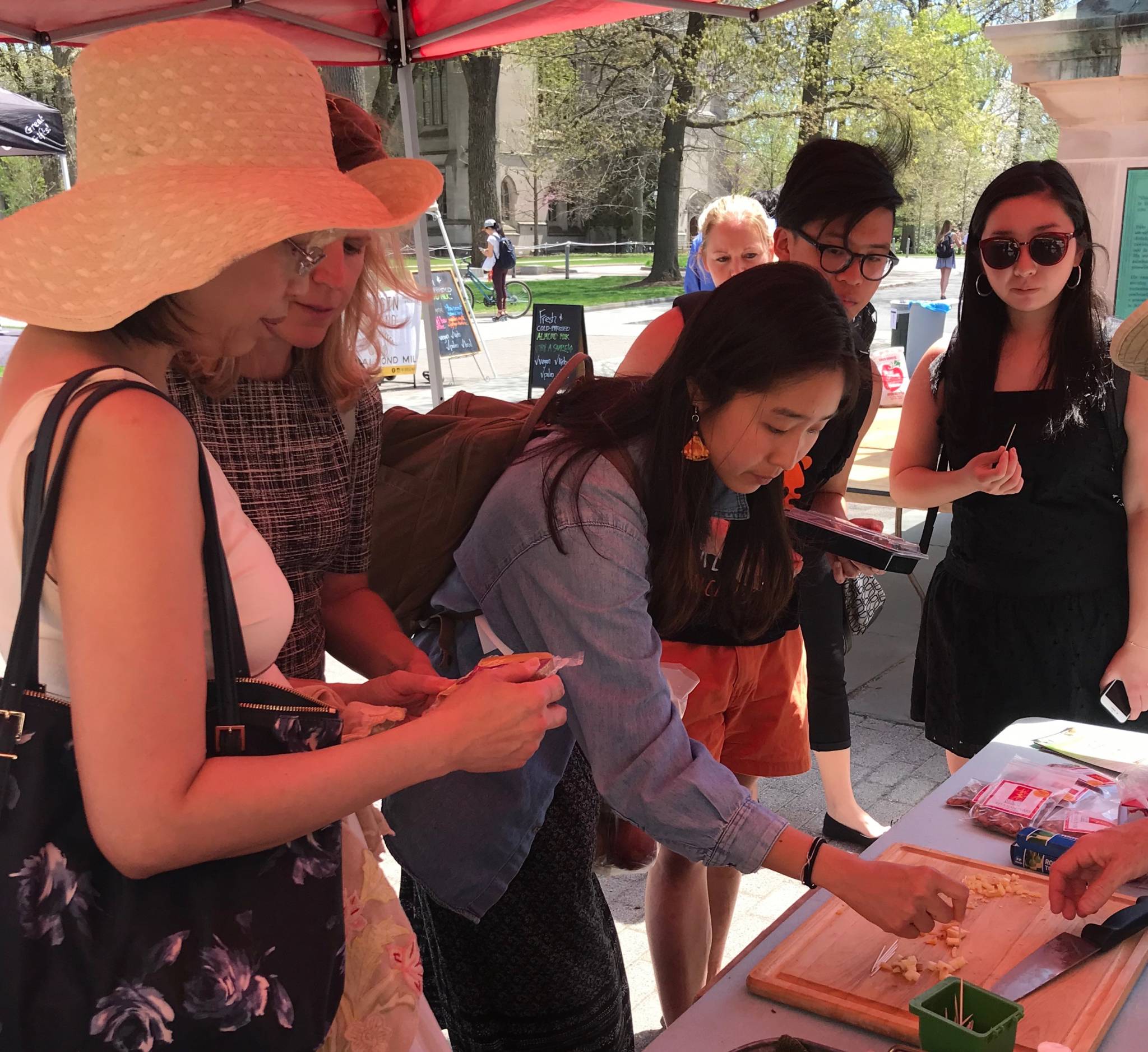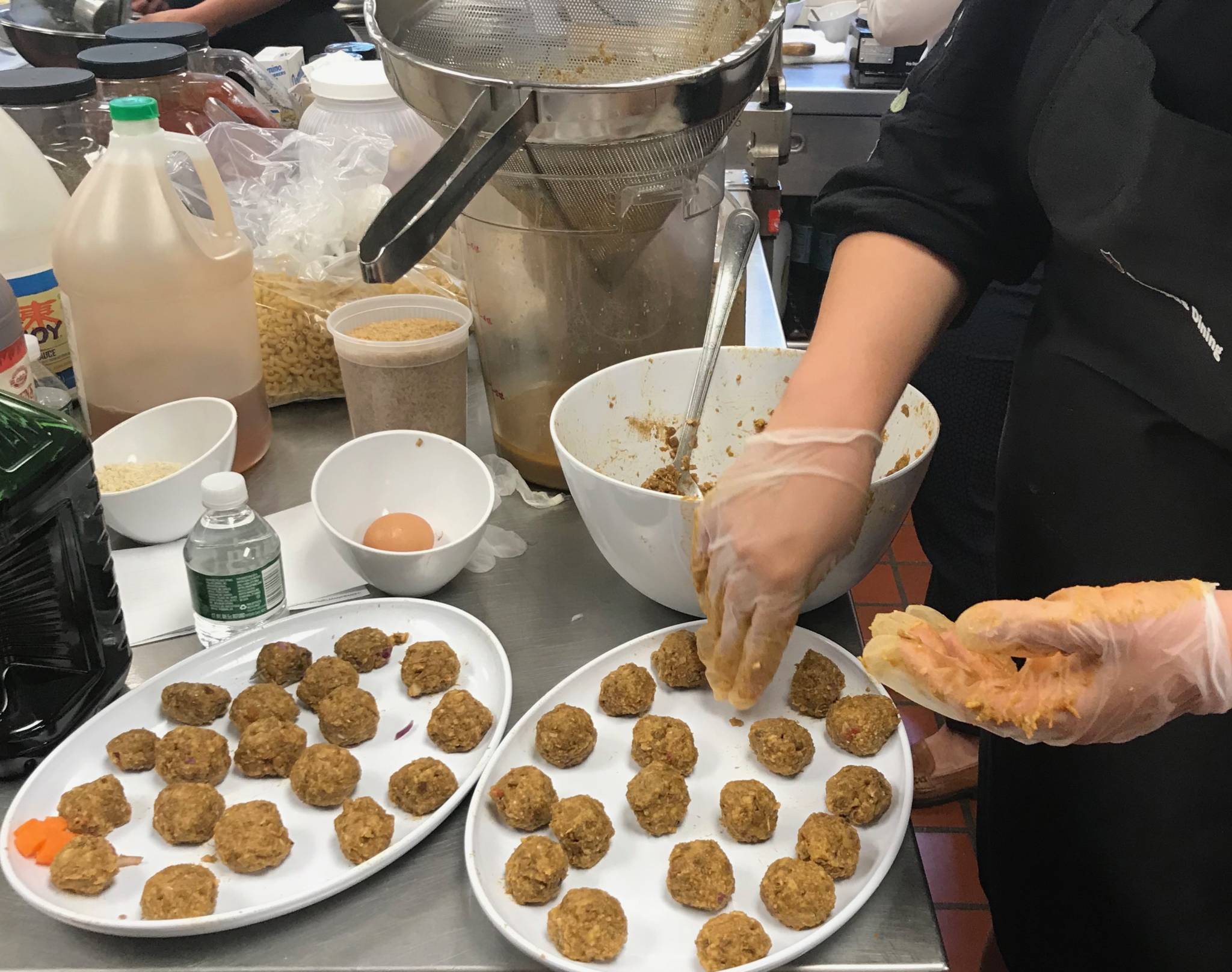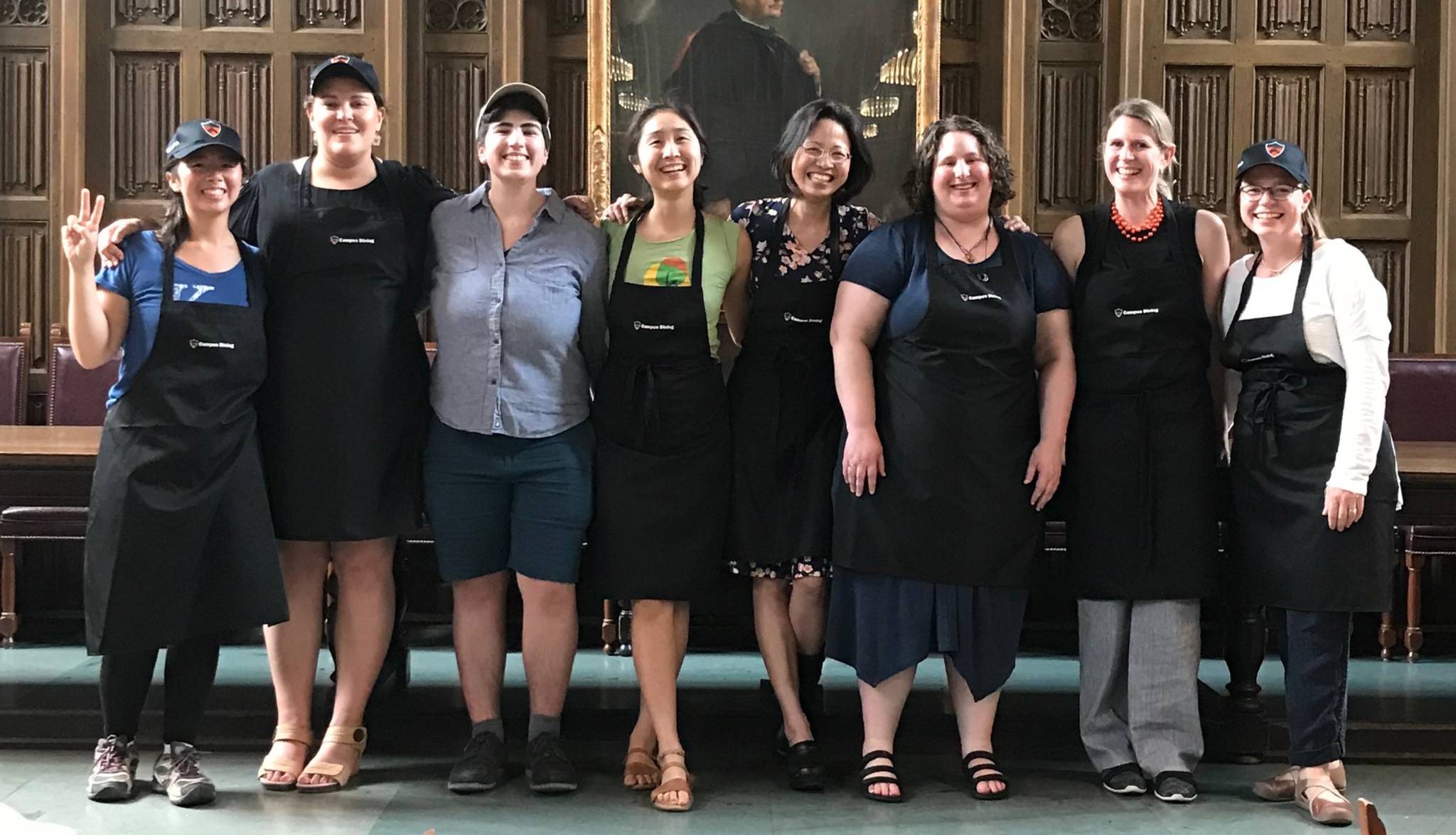This spring the Program in American Studies presented a new research initiative called the “American Studies Collaboratory,” an interdisciplinary and networked learning experience offering the opportunity to explore the most pressing issues in contemporary America.
Under the leadership of three principle investigators, Anne Cheng (English, Director of American Studies), Allison Carruth (UCLA), Angela Creager (History), and Chris Lentz (Campus Dining), in collaboration with CST StudioLab, the Food and Agricultural Initiative, and with the support of the Humanities Council, the Program in American Studies launched the prototype of this concept, focused on the challenges of American food production and consumption: Col(LAB) 1.0 Food Matters: Risk and Privilege.
Over three days, this hands-on investigation brought graduate and undergraduate students and scholars to Firestone Farmer’s Market, Arm in Arm Food Pantry, and into the kitchen of Campus Dining, to prepare a meal for an imaginary family of four, exploring the entangled issues of health, class, culture, innovation, and ecology.
Setting the Parameters
On day one, the group divided into four teams, and received $20.00 per team to purchase fresh ingredients from the farmer’s market in Firestone Plaza in order to feed a family of four. The teams had to consider food options and the budget limit.
“Risk and privilege are important ideas as part of the overall dialogue,” says Lentz. “As the world becomes increasingly connected, coupled with a rapidly growing human population, food systems will become equally strained and central to all types of challenges facing our species—from climate change to hunger to economics.”
Artifacts, Privilege and Cultural Identity
As a way to frame their experience within a personal narrative, participants chose an artifact that spoke to or represented their relationship with food on a personal, cultural, or family level.
Some of the artifacts presented included:
A can of Diet Coke: Chemical additives and body image – Julia Stone (History)
A soybean: Solving global hunger, industrial farming, NGOs – Serena Stein (Anthropology)
A food weighing scale: Body image, privilege in the control of portions – Jimin Kang ’21
Artisanal coffee: Small roasters, privilege, carcinogens – Allison Carruth (UCLA)
A water bottle: Safe drinking water, lack of water sources, danger of plastic – Adam Chang ’20
One thousand-year-old egg: Tradition, family roots, carcinogens – Anne Cheng (English and American Studies)
Fresh egg: Small farms, industrial farming, labor, economic risk – Tessa Desmond (American Studies and farm owner)
Annie Sheng, a graduate student specializing in food studies and modern food ways who joined the Col(LAB) from Cornell University, brought dried Japanese Hondashi (bonito stock) granules. She said, “Where risk and privilege are concerned, this product shines as a condiment for emergency rations; in that way, it helps in times of risk. But, its consumption links to notions of seafood depletion, ecological damage and also raises questions about the Japanese food system in general, including food safety risks such as radiation that continually leaks into the sea from the Fukushima disaster site.”
Angela Creager presented the staple of many Thanksgiving dinners, a can of cranberry sauce, and talked about The Great Cranberry Scare of 1959 when cranberries tainted with herbicide entered the market and a fifty-million-dollar-a-year business collapsed. “More than that, cranberry sauce has an extended shelf life and often ends up as surplus in food pantries year-round. A product with minimal nutritional value that most food pantry customers have no desire to eat on a hot July day,” Creager added.
From Farmer’s Market to Food Pantry
At the Farmer’s Market, the teams made strategic decisions among the limited supply of expensive ingredients. Allison Carruth said, “All around us, we can find invisible forms of risk and privilege. For example, most farmer’s markets in the U.S. serve exclusively a wealthy clientele. If you were receiving food stamps, you would not have access to fresh, local ingredients. And if you were able to use your food stamps, the price would most likely be prohibitive.”

At the farmer’s market on Firestone Plaza
On day two, the Col(LAB) group visited Arm in Arm Food Pantry just blocks away from the Firestone Farmer’s Market, at the Nassau Street Presbyterian Church. Supported by the community, and assisted by volunteers, Arm in Arm is one of the largest pantry programs in the Princeton area, providing nutritious food and nutrition education.
Cecilia Avila, Arm in Arm Princeton Office Director, guided the group through a food pantry experience where a point system is assigned to ingredients based on nutritional value and where total points are assigned based on the number of family members.
She noted that in a town like Princeton, it’s easy to assume that that food scarcity happens elsewhere. “But it happens everywhere,” she says. “One example is the aging population. We have a number of senior citizens who can no longer afford their taxes and who rely on the food pantry to supplement their nutritional needs.”
Creager pointed out that among the staples, including cans of tuna fish and jars of peanut butter, were cans of cranberry sauce.
On day three, Campus Dining chefs Brad Ortega, Jerry Luz, and Michael Gattis and campus wellness dietitian Melissa Mirotta, RDN, welcomed the teams into the kitchen . The Col(LAB)orators used what they purchased from the market. Campus Dining provided basic staples such salt, pepper, spices, and flour. In addition, Campus Dining provided properly stored leftovers from the dining hall to mimic foodstuffs the teams might receive if they were part of a food program or pantry.
Tessa Desmond, who owns and runs a small farm in nearby Hopewell, and her team made a sweet potato stew thickened with the cashew butter they purchased and served with leftover rice.
“Eating is an agricultural act,” says Desmond. “Being more intimate with my food helps me to think about the labor that goes into producing it and how drastically we undervalue the work of farmers and farmworkers. I consider business and industry, where those enterprises can play a role in the food system and where they are destructive. All told, farming is where I do my best intellectual problem solving. The only place better than being on the farm for that kind of thinking is being in community with curious, committed folks from other fields, which is what the Col(LAB) has made possible.”

Falafel made from leftover lentil soup
The final team, led by Jean Bauer (Center for the Digital Humanities), made falafel from leftover lentil soup.
“I’ve spent the past two years researching food insecurity, environmental change, and cycles of commodity boom and bust in Africa,” says Serena Stein, who helped create the falafel. “And yet, while in southern Africa, I ate some of the best food in my life among farmers who, while cash poor, produce great abundance on acre plots and gardens behind their houses.”
“In the US, however, consuming nutritious, and environmentally sustainable food is all too often the domain of the wealthy. The most memorable element of the program was the food pantry, learning how struggling families living amid Princeton’s affluence face even greater risk of food insecurity. Inescapable high prices at supermarkets and farmer’s markets compound the daily pressure to hide that struggle. On the whole, there is a lot more we can do to make Princeton more food secure and sustainable for students and the broader community.”
In the future, each Col(LAB) “module” will look to other themes or issues pressing or prescient in U.S. life and cultures. The Program in American Studies will solicit proposals for either short term, serial, or long-term modules that are related to teaching or research goals, and ask its participants to share in the craft, labor, and pleasure of formulating generative questions and together devising ways to approach those questions.
















